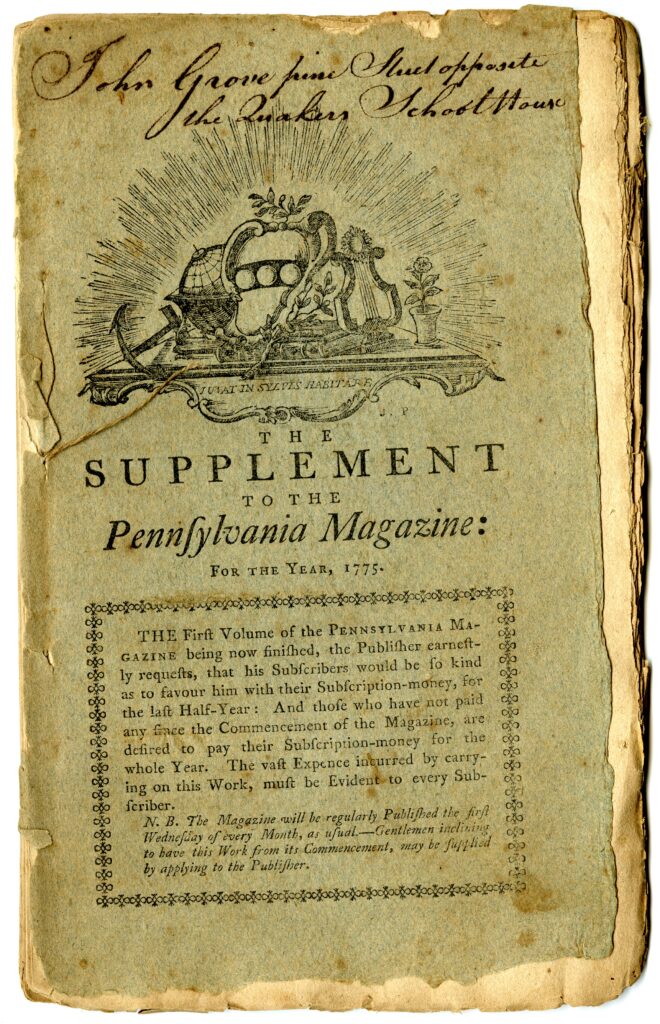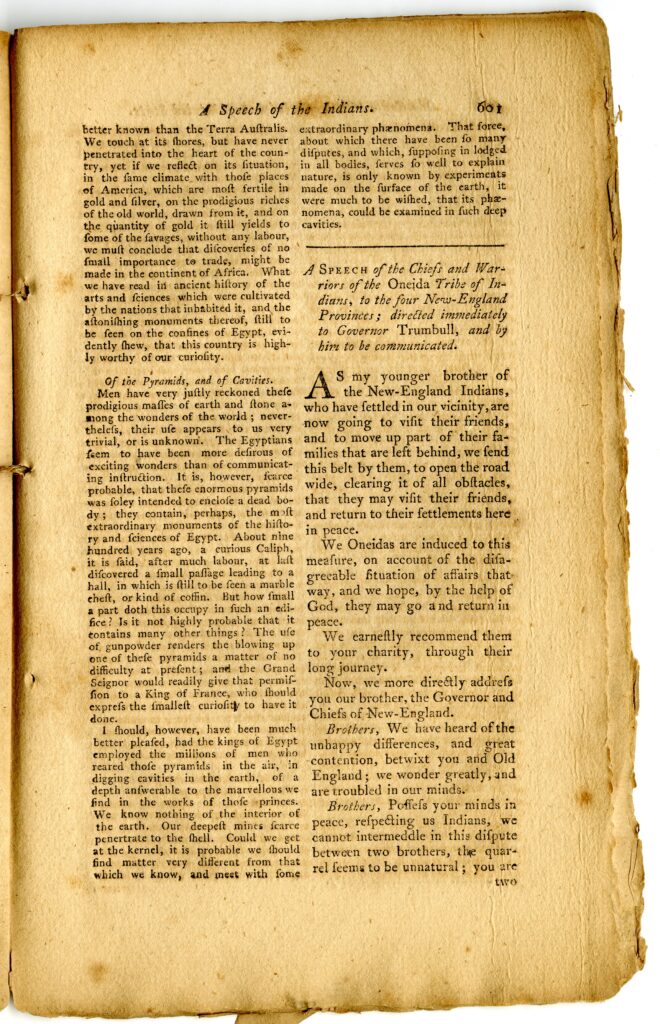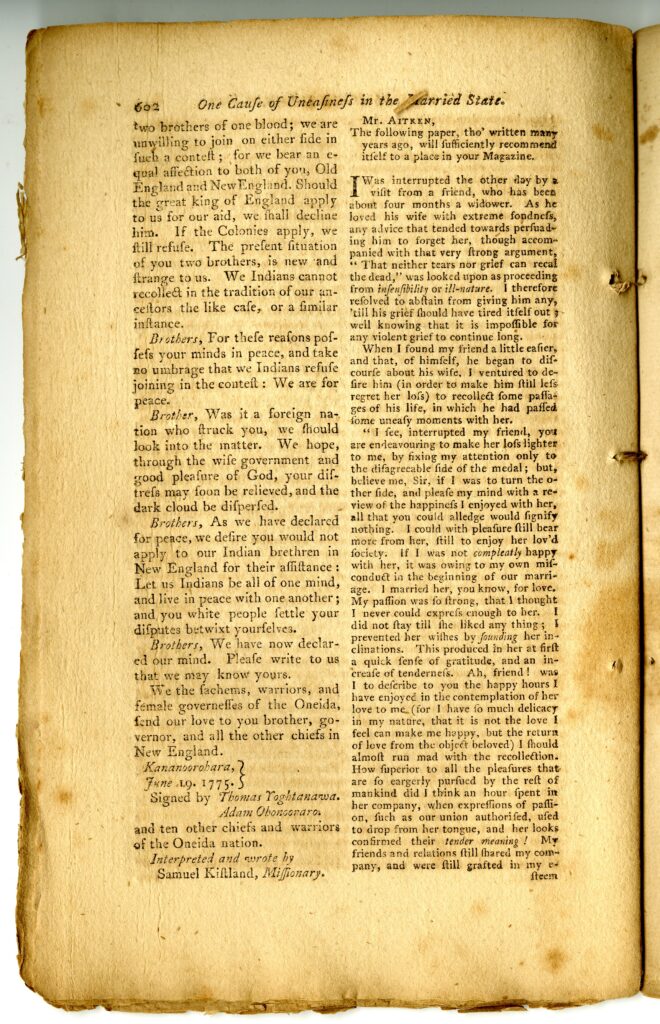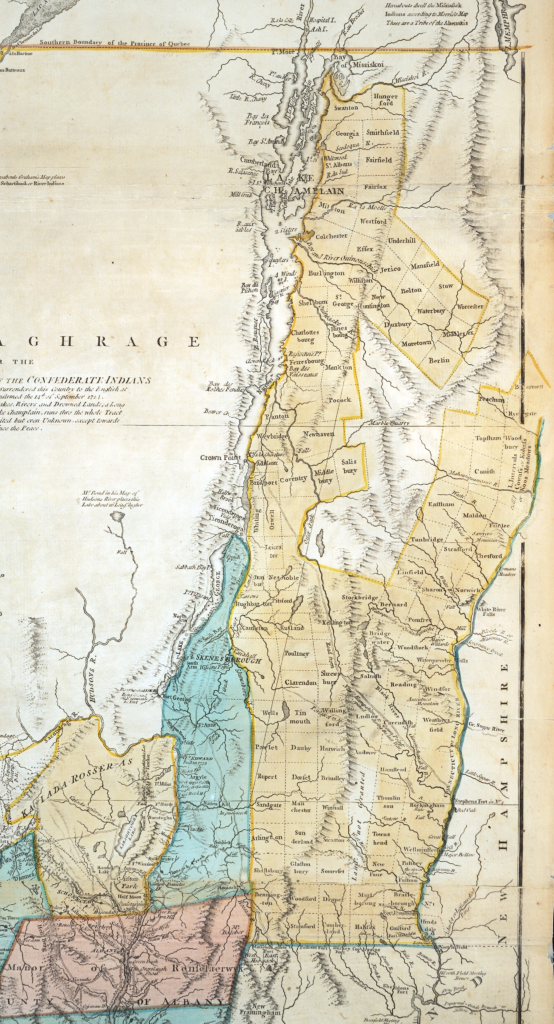Anne Walker, Thomas A. Edison High School (Fairfax County Public Schools), Alexandria, Virginia
DESIGN LEVEL: Middle-High School
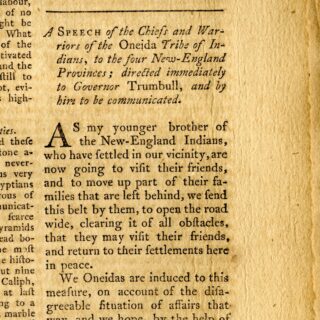
Overview
Students will explore why the American colonies’ greatest Native American supporter, the Oneida Indian Nation, declared neutrality at the onset of the Revolution.
Objectives
Students will:
- Analyze a published speech given by Native American leaders to their colonial counterparts.
- Compare maps from 1763 and 1776 and identify similarities and differences.
- Identify aspects of the Proclamation of 1763 that Native Americans would have supported.
- Identify flaws of the Proclamation of 1763 that prevented its success.
- Infer reasons the Oneidas initially declared neutrality.
Materials
- The supplement to the Pennsylvania Magazine, for the year, 1775, Thomas Paine. Philadelphia: R. Aitken, 1775. The Society of the Cincinnati.
- Royal Proclamation, King George III of England. Issued October 7, 1763. Broadside. [transcript by Gilder Lehrman Collection]
- A new map of North America from the latest discoveries, 1763. London. The New York Public Library Digital Collections.
- The provinces of New York and New Jersey, with part of Pensilvania, and the province of Quebec, Thomas Pownall and Samuel Holland. London, 1776. The Society of the Cincinnati, The Robert Charles Lawrence Fergusson Collection.
Recommended Time
Two 50-minute class periods.
Day 1:
Read Speech of the Chiefs and Warriors of the Oneida Tribe of Indians from the Pennsylvania Magazine supplement aloud as a class. It is suggested that students be given copies of the original Magazine article and be asked to volunteer to read a paragraph or two.
The transcript is provided below, with suggested discussion questions and notes for each paragraph. Alternatively, students may utilize a primary source analysis tool such as those developed by the Library of Congress or Stanford History Education Group to guide their discussion and/or to synthesize what they have learned at the completion of the activity.
Following is a transcript of the speech with [notes] and questions and (answers) for each section:
Speech of the Chiefs and Warriors of the Oneida Tribe of Indians; to the four New-England Provinces; directed immediately to Governor Trumbull and by him to be communicated.
[John Trumbull served as deputy governor of the Colony of Connecticut from 1766 to 1769, and, on the death of Governor William Pitkin, became Governor of Connecticut in 1769, serving in that capacity until 1784, through Connecticut’s transition from a colony to a U.S. state. Although he took office under King George III, when he was asked to assist British General Thomas Gage after the Battles of Lexington and Concord in April 1775, Trumbull refused and made clear his choice to side with the Patriots. Trumbull was one of only two colonial governors to continue in office after independence (the other was Rhode Island’s Nicholas Cooke, who assumed office early in the war). Governor Trumbull was elected as an honorary member of the Connecticut Society of the Cincinnati in 1784.]
What are the Oneidas expecting Trumbull to do with the information they are sending him? (share it with other colonial leaders)
As my younger brother of the New England Indians, who have settled in our vicinity, are now going to visit their friends, and to move up part of their families that are left behind we send this belt by them to open the road wide, clearing it of all obstacles that they may visit their friends and return to their settlements here in peace.
[Handwriting note: the long s. “To modern readers, the long s (written as ‘ſ’) might make you think you’re catching misspellings or typos like “Congrefs” instead of “Congress” or “Loft” instead of “Lost.” Look closer though and you’ll notice that, unlike an f, the character either has no crossbar or only a nub on the left side of the staff. Though it may seem more like an f, the letter is just another variation of the lowercase s.”]
[The belt that was mentioned is a wampum belt. Wampum was used as a historic record, containing a binding story of either a treaty or significant agreement, or a law for the people. In this case, it is used to symbolize the granting of safe passage.]
We Oneidas are induced to this measure on account of the disagreeable situation of affairs that way, and we hope by the help of God, they may go and return in peace.
We earnestly recommend them to your charity through their long journey.
[Native American refugees had been moving west, into Oneida territory. Colonial governments and the English expanded their land claims.]
Why are the Oneidas sharing that a belt has been provided? (they expect the Americans to provide safe passage to Native American refugees who are returning to their homes to visit those remaining or to help others move west)
How would this safe passage benefit the white colonists? (whether the Native Americans are visiting or helping to collect family, the Oneidas would be encouraging them to move beyond the treaty line and out of territory claimed by white colonists)
Now we more directly address you are brother, the governor and chiefs of New England.
Brothers we have heard of the unhappy differences and great contention betwixt you and old England. We wonder greatly and are troubled in our minds.
Ask the students to translate this into their own words. What are the Oneidas concerned about? (the tensions between England and the colonies)
Brothers, possess your minds in peace, respecting us Indians, we cannot intermeddle in this dispute between two brothers, the quarrel seems to be unnatural. You are two brothers of one blood; We are unwilling to join on either side in such a contest, for we bear an equal affection to both of you, Old England and New England. Should the great king of England apply to us for our aid, we shall decline him. If the colonies apply, we still refuse. The present situation of you two brothers, is new and strange to us. We Indians cannot recollect in the tradition of our ancestors, the like case, or a similar instance.
Brothers for these reasons possess your minds in peace, and take no umbridge, that we Indians refuse joining in the contest. We are for peace.
Ask the students to translate this into their own words. Why are the Oneida unwilling to take sides? (they view the tensions as a family matter)
Do the chiefs provide any indication they might get involved? (no, they are for peace)
Brother, was it a foreign nation who struck you, we should look into the matter. We hope, through the wise government and good pleasure of God, your distress may soon be relieved, and the dark cloud be dispersed.
Brothers, as we have declared for peace, we desire you would not apply to our Indian brethren in New England for their assistance. Let us Indians be all of one mind and live in peace with one another, and you white people settle your disputes betwixt yourself.
Ask the students to translate this into their own words. What favor are the chiefs asking of the white colonists? (to respect their wishes and not ask for assistance from other members of the Six Nations) [The Six Nations of the Iriquois Confederacy are the Mohawk, Oneida, Onondaga, Cayuga, Seneca and Tuscarora.]
Ask students to look back at the cover of the The supplement to the Pennsylvania Magazine. What year was it published? (1775)
[Joseph Brant, or Thayendanegea, was a Mohawk Indian chief who fought for the British in the French and Indian War (1754–63). In 1774 he was appointed secretary to Guy Johnson, the British superintendent for northern Indian affairs. In 1775, Brant received a captain’s commission and was sent to England, where he was presented at court. On his return, Brant led four of the six Iroquois nations to fight on the British side during the American Revolution. Thayendanegea, as a Mohawk, was part of the Six Nations.]
Brothers we have now declared our mind. Please write to us that we may know yours.
We the sachems, warriors, and female governesses of the Oneida, send our love to you, our brother, governor, and all other chiefs in New England.
Who wrote this letter? (12 chiefs and warriors of the Oneida nation) Why would the authors of the letter, or the people upon whose behalf it was sent, not include their names? What is a “sachem, warrior, and female governess” of an Indian tribe? (students may need to use their resources to define these roles)
Who is the letter’s intended audience? Was this intended for the Native people? Explain your answer. (The Pennsylvania Magazine was edited from February 1775 to May 1776 by Thomas Paine. The magazine was conceived and founded by the Revolutionary printer, Robert Aitken, best known for his work as a printer for the Continental Congress. Paine was a major contributor as well as editor, sometimes writing under the initials “A.B.” The magazine chronicles month by month, Paine’s sentiments both before and after writing Common Sense. This supplement was printed after the magazine had been produced. It was presented as a flier inserted in the published book. Why might Thomas Paine have felt it necessary to include? Why couldn’t it wait until the following edition?)
Day 2:
The class will focus on why the Onieda chose neutrality during the American Revolution.
If students are unfamiliar with the French and Indian War, supply them with the following background.
During the French and Indian War (1754 – 1763), Native Americans found themselves caught between France and England’s claims to the land of North America. Rather than a single group of people, there were dozens of different American Indian tribes, and they viewed each other as different people with different desires in the conflict. They also had dissention among themselves and would occasionally change sides depending on who was winning the war.
Most of the Indian tribes supported France in the war. French Catholic missionaries had been converting large numbers of Indians to Catholicism since they first arrived in the New World. The French were also less interested in displacing the Indians, but rather claimed them as a protectorate. In this role, the Indian tribes could retain their autonomy within the French territory. They frequently traded with the French and lived in relative peace.
The Algonquin-speaking people largely supported the French, including the Wabanaki Confederacy, the Mi’kmaq, the Abenakis, the Ojibwa, the Lenape, the Ottawa, and the Shawnee, among many others. The Innu and Wyandot tribes also sided with the Algonquins and French. However, some Indian tribes allied with the British, including the Iroquois Confederacy (made up of the Mohawk, Oneida, Onondaga, Cayuga, Seneca, and Tuscarora people), along with some other tribes.
On October 7, 1763, King George III issued a Proclamation that would cause much resentment among American colonists. During the Seven Years’ War—called the French and Indian War in America—England, with the assistance of such American colonists as George Washington, won territory in North America from France. The Proclamation forbade white settlement on lands west of the Appalachian Mountains, which would be “preserved to the said Indians.” In keeping American colonists out of the newly won land, England hoped to avoid further conflict with Indian tribes and exert better control over colonial commerce and land speculation.
ACTIVITY 1:
The following excerpts address Native American claims to North American territory. It is suggested that older students jigsaw these excerpts, identifying one or two key points from each selection. For younger students, or those with less background, the teacher might display the text and lead students to discern the meaning.
And whereas it is just and reasonable, and essential to Our Interest and the Security of Our Colonies, that the several Nations or Tribes of Indians, with whom We are connected, and who live under Our Protection, should not be molested or disturbed in the Possession of such Parts of Our Dominions and Territories as, not having been ceded to, or purchased by Us, are reserved to them, or any of them, as their Hunting Grounds; We do therefore, with the Advice of Our Privy Council, declare it to be our Royal Will and Pleasure, that no Governor or Commander in Chief in any of Our Colonies of Quebec, East Florida, or West Florida, do presume, upon any Pretence whatever, to grant Warrants of Survey, or pass any Patents for Lands beyond the Bounds of their respective Governments, as described in their Commissions; as also, that no Governor or Commander in Chief in any of Our other Colonies or Plantations in America, do presume, for the present, and until Our further Pleasure be known, to grant Warrants of Survey, or pass Patents for any Lands beyond the Heads or Sources of any of the Rivers which fall into the Atlantick Ocean from the West and North West, or upon any Lands whatever, which, not having been ceded to, or purchased by Us as aforesaid, are preserved to the said Indians, or any of them.
(This excerpt prohibits the government from granting English colonists the ability to settle in any lands not purchased from Native Americans.)
And We do further declare it to be Our Royal Will and Pleasure, for the present as aforesaid, to reserve under Our Sovereignty, Protection, and Dominion, for the Use of the said Indians, all the Lands and Territories not included within the Limits of Our said Three New Governments, or within the Limits of the Territory granted to the Hudson’s Bay Company, as also, all the Lands and Territories lying to the Westward of the Sources of the Rivers which fall into the Sea from the West and North West, as aforesaid; and We do hereby strictly forbid, on Pain of Our Displeasure, all Our loving Subjects from making any Purchases or Settlements whatever, or taking Possession of any of the Lands above reserved, without Our especial Leave and License for that Purpose first obtained.
(This section draws what would come to be known as the Proclamation Line.)
And We do further strictly enjoin and require all Persons whatever, who have either wilfully or inadvertently seated themselves upon any Lands within the Countries above described, or upon any other Lands, which, not having been ceded to, or purchased by Us, are still reserved to the said Indians as aforesaid, forthwith to remove themselves from such Settlements.
(This section instructs any colonist living to the west of the line to move back to land belonging to England.)
And whereas great Frauds and Abuses have been committed in the purchasing Lands of the Indians, to the great Prejudice of Our Interests, and to the great Dissatisfaction of the said Indians; in order therefore to prevent such Irregularities for the future, and to the End that the Indians may be convinced of Our Justice, and determined Resolution to remove all reasonable Cause of Discontent, We do, with the Advice of Our Privy Council, strictly enjoin and require, that no private Person do presume to make any Purchase from the said Indians of any Lands reserved to the said Indians, within those Parts of Our Colonies where We have thought proper to allow Settlement; but that if, at any Time, any of the said Indians should be inclined to dispose of the said Lands, the same shall be purchased only for Us, in Our Name, at some Publick Meeting or Assembly of the said Indians to be held for that Purpose by the Governor or Commander in Chief of Our Colonies respectively, within which they shall lie; and in case they shall lie within the Limits of any Proprietary Government, they shall be purchased only for the Use and in the Name of such Proprietaries, conformable to such Directions and Instructions as We or they shall think proper to give for that Purpose: And We do, by the Advice of Our Privy Council, declare and enjoin, that the Trade with the said Indians shall be free and open to all Our Subjects whatever; provided that every Person who may incline to trade with the said Indians, do take out a License for carrying on such Trade from the Governor or Commander in Chief of any of Our Colonies respectively, where such Person shall reside; and also give Security to observe such Regulations as We shall at any Time think fit, by Ourselves or by Our Commissaries to be appointed for this Purpose, to direct and appoint for the Benefit of the said Trade; and We do hereby authorize, enjoin, and require the Governors and Commanders in Chief of all Our Colonies respectively, as well Those under Our immediate Government as Those under the Government and Direction of Proprietaries, to grant such Licenses without Fee or Reward, taking especial Care to insert therein a Condition, that such License shall be void, and the Security forfeited, in case the Person, to whom the same is granted, shall refuse or neglect to observe such Regulations as We shall think proper to prescribe as aforesaid.
(This final section declares that if Native Americans wish to sell land west of the Proclamation Line, it would be a public sale to the King, not to an individual. Other trade between Indians and colonists is encouraged and will be regulated by the colonial government.)
Encourage discussion among students using the following prompts:
● As a Native American whose lands are protected by this Proclamation, how would you feel towards the English?
● Is this Proclamation fair to the Native Americans? Is it fair to the colonists?
● How might this Proclamation preserve peace between the groups?
● What possible issues could arise if this Proclamation is not followed?
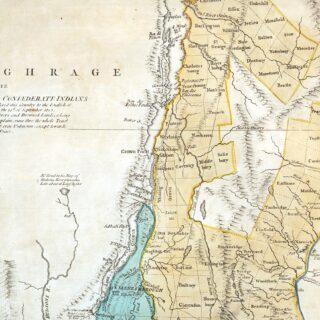 ACTIVITY 2:
ACTIVITY 2:
Display A new map of North America from the latest discoveries, 1763 and zoom in to the New York area. Draw students’ attention to the label “Six Nations” (across Lake Erie and Lake Ontario). The red line depicts the Proclamation Line. The red area was for colonists, the green reserved for Native Americans.
ACTIVITY 3:
Present students with the excerpted view from The provinces of New York and New Jersey, with part of Pensilvania, and the province of Quebec map. Provide students with limited direction but ask how the this map compares to the 1763 map, and how they are related.
As students compare the two maps, have them seek out common place names. They should notice that the Oneida territory (labeled on the 1776 map above Tyron County) is very close to the Proclamation Line.
Culminating Activity
Ask students to identify why the Oneida Indian Nation declared neutrality, citing evidence from the primary sources examined. Students may be asked to demonstrate their understanding by creating a product based on their differentiated learning style.
Extension
The chieftains were diplomatic in their 1775 letter to Colonial leaders. It is possible that the influence of Samuel Kirkland—a missionary whose friendship with the Oneida people led many to side with the American cause during the Revolution—and/or his interpretation, affected the message.
Write a letter from an Oneida chieftain to the leaders of the American colonists as well as the English government in America. Explain how your tribe regards colonial and English relations and explain why you will not involve yourself in the war.
Standards Addressed
COMMON CORE: English Language Arts Standards—History/Social Studies—Grade 6-12
Historical Analysis and Skills Development: Reading, Writing, Speaking, Listening;
Writing: Key Ideas and Details; Craft and Structure: Integration of Knowledge and Ideas
